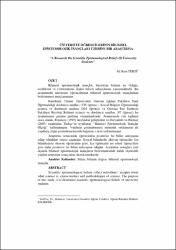Üniversite Öğrencilerinin Bilimsel Epistemolojik İnançları Üzerine Bir Araştırma
Özet
Bilimsel epistemolojik inançlar, bireylerin bilimin ne olduğu,
özellikleri ve yöntemlerine ilişkin felsefi anlayışlarını yansıtmaktadır. Bu
araştırmada üniversite öğrencilerinin bilimsel epistemolojik inançlarının
belirlenmesi amaçlanmıştır.
Karadeniz Teknik Üniversitesi Giresun Eğitim Fakültesi Sınıf
Öğretmenliği dördüncü sınıfları (236 öğrenci), Sosyal Bilgiler Öğretmenliği
üçüncü ve dördüncü sınıfları (104 öğrenci) ve Giresun Fen Edebiyat
Fakültesi Biyoloji Bölümü üçüncü ve dördüncü sınıfları (97 öğrenci) bu
araştırmanın çalışma grubunu oluşturmaktadır. Araştırmada veri toplama
aracı olarak, Pomeroy (1993) tarafından geliştirilen ve Deryakulu ve Bıkmaz
(2003) tarafından Türkçe’ye uyarlanan “Bilimsel Epistemolojik İnançlar
Ölçeği” kullanılmıştır. Verilerin çözümlenmesi aritmetik ortalamalar ile
yapılmış, ilişki çözümlemelerinde bağımsız t-testi kullanılmıştır.
Araştırma sonucunda öğrencilerin pozitivist bir bilim anlayışına
sahip oldukları ortaya çıkmıştır. Sosyal bilimlerde okuyan öğrenciler fen
bilimlerinde okuyan öğrencilere göre, kız öğrenciler ise erkek öğrencilere
göre daha pozitivist bir bilim anlayışına sahiptir. Araştırma sonuçları yurt
dışında bilimsel epistemolojik inançların belirlenmesinde farklı ölçeklerle
yapılan araştırma sonuçlarını desteklemektedir. Scientific epistemological beliefs reflect individuals’ insights about
what science is, characteristics and methodologies of science. The purpose
of this study is to determine scientific epistemological beliefs of university
students. The study group consisted of 437 university students from the
department of biology (97 students) at Giresun Faculty of Arts and Science,
104 students at the department of social science education and 236 students
at the department of elementary education in Education Faculty of Giresun,
Blacksea Technical University. “Scientific Epistemological Beliefs Survey”
developed by Pomeroy (1993) and adapted in Turkish by Deryakulu and
Bıkmaz (2003) was used to collect the data. In data analysis, the descriptive
and independent samples t-test analyses are run and examined to analyze the
data.
The results of the study indicate that the students have a positivist
scientific perspective. The students from Social Sciences Education have a
more positivist perspective than those from Science Education, and similarly
the female students more than male ones. The findings of this study support
the results of studies on determination of scientific epistemological beliefs
conducted in different countries and with different instruments.
Cilt
7Sayı
2Bağlantı
http://hdl.handle.net/11630/3561Koleksiyonlar
- Cilt 7 : Sayı 2 [17]



















